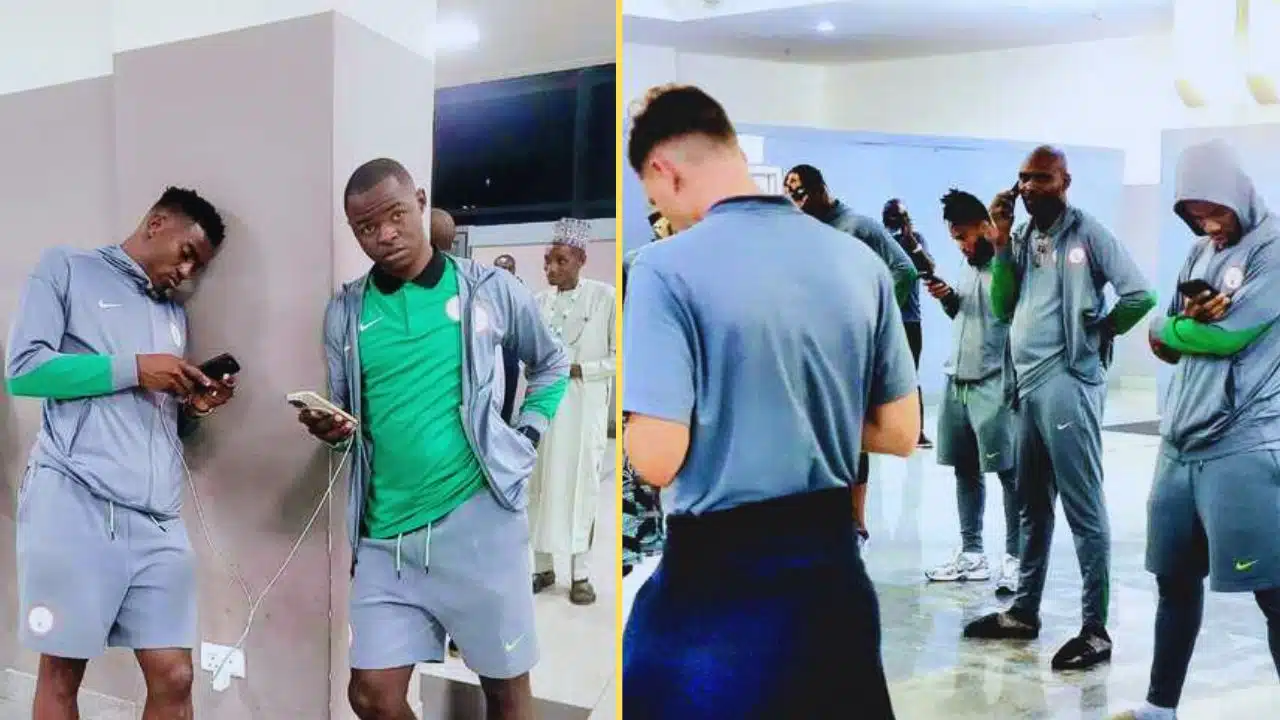The Libyan Football Federation (LFF) is facing growing criticism after an incident involving Nigeria’s Super Eagles, which has shocked football fans and stakeholders across the globe. The Nigerian team, arriving in Libya for the second leg of their 2025 Africa Cup of Nations (AFCON) qualification match, was left stranded without food and essential support at Al Abraq Airport. This action, widely viewed as unprofessional and unacceptable, forced the Nigerian team to forfeit the match, sparking outrage and calls for accountability.
Nigerian Team Left Stranded Without Basic Resources
The Nigerian Super Eagles, who were in Libya for their AFCON qualification clash, found themselves in an extremely difficult and unexpected situation upon landing at Al Abraq Airport. Reports indicate that the team members were left unattended, with no provisions for basic necessities such as food, accommodation, or even transport to the stadium.
For hours, players and coaching staff reportedly waited without any form of assistance from the Libyan Football Federation, which had the responsibility of hosting and providing for their international counterparts. The situation became so dire that the Nigerian team had no choice but to abandon their qualification game. This decision not only disrupted their AFCON campaign but also left the players and officials demoralized and frustrated.
As the news of the incident spread, it immediately caught the attention of the Confederation of African Football (CAF), which strongly condemned the actions of the Libyan authorities. CAF, in its official statement, expressed deep concern over the lack of professionalism and the failure of the Libyan Football Federation to meet the basic obligations required when hosting an international football team.
CAF’s Strong Response and Potential Sanctions Against Libya
The Confederation of African Football (CAF) wasted no time in issuing a scathing statement condemning the actions of the Libyan Football Federation. In its remarks, CAF emphasized that the treatment of the Super Eagles was in violation of the standards set for hosting international teams and described the entire ordeal as “completely unacceptable.” CAF’s statement also called for an investigation into the incident, suggesting that there could be sanctions imposed on the Libyan Federation if found guilty of failing to provide adequate support.
Football experts believe that CAF could impose a range of penalties on the LFF, which could include fines, the suspension of Libya from hosting future AFCON qualifiers, or other disciplinary measures. This has led to mounting pressure on the Libyan Football Federation to offer a public apology and explanation for their actions. However, as of now, there has been no formal response from the LFF.
The incident has further raised concerns about the organization and management of international tournaments and the responsibilities of host nations. It has also sparked debates about how visiting teams should be treated to ensure fair play and mutual respect between nations.
Outrage from Football Stakeholders and Fans
Following the shocking treatment of the Super Eagles, the incident has triggered widespread outrage from various football stakeholders, players, and fans alike. Many within the football community have condemned the Libyan Football Federation, calling their actions unprofessional and a violation of the spirit of sportsmanship that should govern international competitions.
Football pundits and analysts have been vocal in their criticism, with some stating that such behavior undermines the integrity of African football as a whole. Social media platforms have been flooded with comments from fans of both Nigeria and Libya, as well as from neutral supporters, expressing their dismay over the situation. Many have called for CAF and FIFA to take immediate action to prevent such incidents from occurring in the future.
Marco Silva Weighs In on the Situation: “It’s Unacceptable”
Among the prominent voices speaking out against the Libyan authorities is Fulham’s Premier League manager, Marco Silva. Silva, who has a vested interest in the well-being of his players, Alex Iwobi and Calvin Bassey—both members of the Super Eagles—addressed the situation in a pre-match press conference ahead of Fulham’s clash with Aston Villa. Silva didn’t hold back in condemning the treatment of his players during their international duty.
In his statement to reporters, Silva expressed his shock and disappointment at how the Nigerian team was treated, particularly how it impacted the fitness and mental well-being of Iwobi and Bassey. Silva highlighted the importance of national team duty and the expectations clubs have when players represent their countries.
“It’s a situation that brings mixed feelings,” Silva said. “When players represent their national teams, we all expect them to return healthy and ready to compete for us. Moreover, we hope they can perform at a high level, maintain their fitness and momentum, and, most importantly, enjoy playing for their countries. Unfortunately, that was not the case for Calvin, Alex, and their teammates.”
The Fulham coach went on to describe the experience as neither “professional” nor “normal,” stressing that such incidents have no place in football. He added that both Iwobi and Bassey had endured a difficult first two days back with the team, as they recovered from the physical and mental strain caused by their ordeal in Libya.
However, Silva did express confidence that despite the challenges, his players would be ready to compete in Fulham’s upcoming Premier League fixture against Aston Villa. “They are back with us now,” Silva continued, “and while the first two days were tough for them as they recovered from everything, I am confident they will be ready to play.”
Concerns Over Player Fitness and International Duty
Silva’s comments also raised a broader issue about player fitness and the toll that international duty can take on footballers. Representing their countries is often seen as a matter of pride for players, but incidents like the one in Libya highlight the potential risks involved, particularly when host nations fail to meet their obligations.
Football clubs rely on their players to return from international duty in good health, both physically and mentally. When such incidents occur, it not only disrupts the player’s ability to perform at their best but also has a ripple effect on their club’s performance. Silva’s concerns about Iwobi and Bassey’s readiness for the upcoming match against Aston Villa underscore the delicate balance between club and international commitments, as well as the responsibility of football federations to ensure players are treated with respect and professionalism.
Broader Implications for International Football
The incident involving the Super Eagles in Libya is more than just a logistical failure; it reflects deeper issues within the administration and organization of international football. Questions are being raised about how such an oversight could have occurred, and what measures need to be taken to prevent similar incidents in the future.
Football governing bodies, including CAF and FIFA, have stringent guidelines for hosting international matches, which cover everything from player accommodations to transport and security. However, the Libyan Football Federation’s failure to meet these requirements has sparked a larger conversation about the enforcement of these rules and the consequences for nations that fail to comply.
There is also concern about the potential long-term impact on the players involved. While footballers are trained to handle pressure on the field, incidents like the one in Libya can take a psychological toll, affecting not only their immediate performance but also their long-term career trajectory.
Calls for Accountability and the Future of AFCON Qualifications
As the criticism of the Libyan Football Federation grows, there are increasing calls for accountability. Many believe that CAF must take decisive action, not only to ensure that such incidents do not happen again but also to send a strong message to other nations about the importance of treating visiting teams with respect.
The outcome of CAF’s investigation into the Libyan Football Federation’s actions could set a precedent for how similar cases are handled in the future. Football stakeholders are eagerly awaiting the results, as they will likely influence how future AFCON qualification matches are organized and the level of scrutiny placed on host nations.
The unfortunate events in Libya have cast a shadow over what should have been a routine AFCON qualification match. Instead, it has become a major talking point in the football world, highlighting the need for better oversight and accountability in international football.
The Information is Collected from MSN and Yahoo.






































